When I began studying health and nutrition over 10 years ago, there was zero guidance on how to drink. What began as a positive journey spiraled into intense anxiety around social situations. I wanted to share a drink with friends at dinner (but I don't want to pay for it the next day).
Avoiding alcohol altogether is the path for some. But the truth is, I like alcohol. If you're reading this guide, you do too.
And you are wondering, How can I drink without feeling crappy the next day? What do I order at a bar? What do I buy in the store? What steps can I take when I know I'm going to drink to feel good the next day?
This guide will teach you all about alcohol - how your body digests it, how it impacts your health, how to nip hangovers in the bud, what to order, and what to take supplement-wise to wake up hangover-free.
Let's dig in.
Note: If you just want the practical how-to's jump to Parts II + III.
Part I: What you need to know about alcohol metabolism + your health
Alcohol is a case of mistaken identity. It looks like a carbohydrate but metabolizes like a fatty acid. It provides calories like a food but behaves like a drug.
The health impact of the mistaken identity of alcohol is doubling the work of the body to process it. Metabolic AND immune burden increase at the same time. In addition, alcohol often mixes with late nights and less, poorer quality sleep, compromising immune function even more. Talk about reverse bang-for-your-buck effect.
Some people are more sensitive to these effects than others. Some must avoid alcohol completely. For others the poison is in the dose.
In this section you will learn all about alcohol's metabolism and how it impacts your health.
Alcohol Fun Facts:
What happens when you drink
When you drink alcohol absorbs in the stomach (~20%) or the small intestine (~80%) (10) and on an empty stomach can reach your brain in one minute.
The liver is the primary organ where alcohol detoxification happens, but the stomach, pancreas, and brain also help.
While the liver detoxifies as much alcohol as possible, the rest of the consumed ethanol freely circulates in the blood. This freely circulating ethanol is your Blood Alcohol Concentration (BAC). Your BAC is influenced by biological sex, ethnicity and genetic differences, and any food consumed.
For example, women produce less of the enzyme alcohol dehydrogenase (ADH) in their stomach cells than men. And women typically have more body fat and less water in their tissues than men. This means that, as a drug, alcohol affects women longer and clears more slowly than it does for men (2). Thus, tolerance is lower, but health risks are higher.
Alcohol metabolism
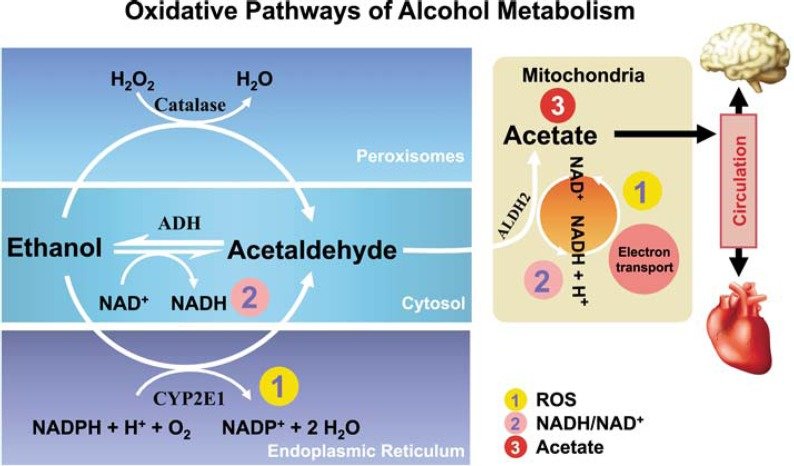
Alcohol Metabolism | Zakhari, Samir. (2013). Alcohol Metabolism and Epigenetics Changes. Alcohol research : current reviews. 35. 6-16.
While the above figure may look like gobbledegook to you, what you need to know is that the products and byproducts of alcohol metabolism - acetaldehyde and free radicals - are toxic and damaging to tissues and play fundamental roles in cancer formation.
Most of the body's free radicals ("oxidants") come from normal metabolism in the electron transport chain.
With alcohol, this free radical burden increases through the second pathway alcohol can be metabolized - The CYP2E1 Pathway. This is the same pathway that metabolizes drugs like acetaminophen and produces free radicals in the process.
It is thought that this second, free-radical-producing pathway does not kick in except through heavy chronic drinking, but as little as 40g/1.4 oz (less than a shot) of alcohol per day can significantly increase this enzyme within one week and persist up to a week after of withdrawal (11).
Because of this, these byproducts must be de-toxified ASAP with the B-vitamin thiamine or the body's master antioxidant glutathione (immune system).
Below is a visual of all the potential side effects of regular alcohol use. We will use this chart to consider the nutritional, health, and lifestyle strategies to practice when you drink.
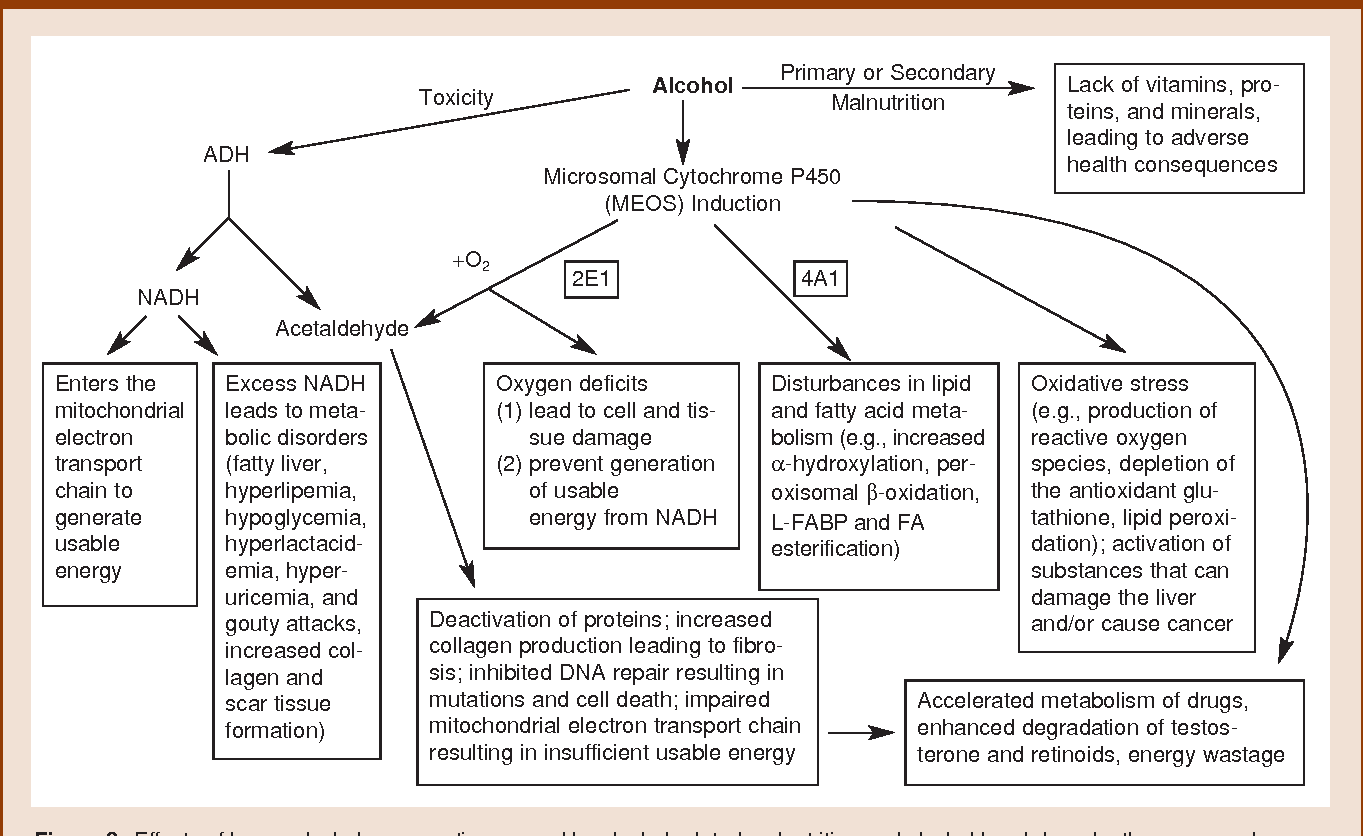
Lieber, Charles S.. “Relationships Between Nutrition, Alcohol Use, and Liver Disease.” Alcohol research & health : the journal of the National Institute on Alcohol Abuse and Alcoholism (2003).
For the health-conscious human who drinks, know that alcohol is the definition of an "empty calorie" both nutritionally and physiologically. It takes more than it gives.
So the main goal when drinking should be to limit the amount and duration of acetaldehyde and free radicals in the body while supporting the body's natural detoxification processes.
Where do hangovers come from?
Since you've begun your healthy lifestyle by choice or demand (e.g., celiac, food sensitivities, etc.), you may have noticed your tolerance for alcohol has decreased. If you drink more than one or two, you pay for it.
Acetaldehyde circulating in the blood is one culprit for many of the ill effects of alcohol while drinking, including:
- flushed face
- increased heartbeat
- digestive issues
- increased skin temperature
- nausea
- headache
- dry mouth (4)
But the jury is still out on whether it is the main cause of hangovers. Other theories include:
- increased immune inflammatory response (12)
- dehydration (13)
- congeners: byproducts or additives from various fermentation and finishing processes (13)
Whatever the cause, this guide will help you navigate alcohol at a party, restaurant, or store in a way that supports your enjoyment, your ethics, and your health.
Here's what you need to know when it comes to alcohol & your health
Alcohol either directly or secondarily affects the following:
- Alcohol can impair the body's capacity to effectively detoxify estrogen (6) in both sexes.
- Alcohol interacts with every part of digestion from delayed stomach emptying (17) to gut inflammation (16) to increasing bacterial growth and intestinal permeability (18).
- Alcohol impacts the immune system: increasing inflammation (12) and depleting glutathione and vitamin C.
- Depletes B-vitamins.
- Impairs fat soluble vitamins A, D, E, and K
- Impairs Nutrient absorption + facilitation: zinc, magnesium, chromium, calcium and iron (14)
- Depletes serotonin
In the next section you'll learn what to look for when drinking to limit the burden on your body.
Part II: How to drink
Pictured are standard serving sizes of different forms of alcohol.
How much can I drink?
When it comes to your health the amount of alcohol you drink on a regular basis matters.
Regular "moderate" drinking should never be a habit for the health-conscious. Moderate drinking is defined by the National Institute for Alcohol Abuse and Alcoholism as:
- Women: 3 drinks in one day / 7 drinks per week
- Men: 4 drinks in one day / 14 drinks per week (8)
This is way too much in my opinion. Lara Briden, ND recommends women consume ≤2 drinks per sitting / ≤ 5 drinks per week (7) to support female health. For men ≤3 drinks in one day / ≤ 7 drinks per week.
In my own practice, I recommend that if you drink, aim to limit it to one day a week, if possible, and no more than 3-5 drinks per week (for all sexes).
How much to drink
Women: ≤ 2 drinks per day / ≤ 5 drinks per week
Men: ≤ 4 drinks per day / ≤ 7 drinks per week
How to stop drinking once you start
If you have trouble drinking less once you've had one, this section is for you. Not having control with a behavior can be part mental, part physical, and part habit.
If you still "need to get wasted" when you drink or "can't relax" at a party without it, please go see a therapist. Using any substance - alcohol, food, drugs, busy-ness - to numb your feelings or feel like yourself is doing more to harm your health than a few drinks.
But as an ALL-or-NOTHING person myself, I know what it's like to have trouble turning it off at one or two. Over the years, through extensive trial and error, and through stealing strategies from my friends and clients, here are some ideas that might work for you too:
- CREATE SPACE: Between each drink, drink one full glass of water (drink - water - drink - water...). This slows you down + gives you space to decide if you truly want more or if it is just getting caught up in the excitement of the event.
- ASK YOURSELF: How do I want to feel tomorrow? Making decisions based on how your future self will feel helps you act in alignment in the moment. PLUS, the way human nature works is that we will move mountains to avoid pain so this question helps you attach outcomes to pain stimuli and make a better decision in the present.
- PURE DECEPTION: If social pressure is a real concern of yours or you simply want to avoid awkward conversations + endless explanations, order a fancy non-alcoholic drink, like sparkling water with mint + lime and a hint of cherry juice, non-alcoholic beer, or the new Seedlip Spirits (non-alcoholic). Everyone assumes and no one asks. Another take on this is to drink 1/2 and refill with sparkling water. Keep refilling the same glass.
- ONE + DONE: I love this one. Pour everything you plan on drinking for the night in one glass. Either one or two servings of wine or spirits in one glass. This strategy capitalizes on your willpower while you have it and limits further exchanges with the bottle. When it’s gone, it’s gone. Period. Personally, I gulp whatever beverage I hold (be it coffee, tea, water, hot chocolate... or alcohol). This helps me slurp less, savor more, and make it last all evening.
- BUY ONLY WHAT YOU WANT TO CONSUME. Only bring into your home what you are 100% okay with consuming. If that's one drink, buy one. If it's two, buy two. Or only drink when you are in a restaurant as the expense may deter you from multiple drinks.
Maybe you have other strategies that help you. Leave them in the Comments Section and I will include them in future iterations of this Guide.
Additives in alcohol
Many alcoholic drinks are more than just ethanol + water (unless you drink straight Everclear). They are the barrels in which they were fermented and the fields in which the grain or fruit grew. They can include additives, preservatives, extra sugar, food coloring, and more.
What you consume matters.
Wine can contain as many as 60 additives to affect color, taste, texture, acidity, and more. This doesn’t include any of the common chemicals sprayed on the grapes before harvesting - pesticides, herbicides, antifungals, insecticides, and chemical fertilizers. And this doesn’t include any refined sugar added post-fermentation.
Beer may be even worse in the additive-department because the industry is much more vague on the approved ingredients list. Unlike the specific ingredients + their usages in the wine category above, the policy on beer stipulates “other food materials” and “You may use flavors and other nonbeverage ingredients (?) containing alcohol in producing beer.” Here’s a piece by FoodBabe covering the big name beer brands.
If you really want to dive down the rabbit hole, read this IARC Monograph on Evaluation of Carcinogenic Risks to Humans: Alcohol that covers the chemical composition and compounds in spirits, wine, and beer. Fun fact: there’s up to 0.9% formaldehyde in fresh beer.
The point: If you feel gross after a drink or two, it could be an additive, not the drink itself.
From a health perspective, here is my take:
- Limit refined sugar (another "empty calorie")
- Limit additives
- Limit alcohol burden
- Limit gluten if you are sensitive
The same principles that apply to food apply to alcohol. In the context of a nutrient rich whole foods diet, most healthy individuals can consume an occasional drink or two without feeling like crap.
BUT the more you add - alcohol + refined sugar (in drinks or foods) + additives + food sensitivities + poor sleep - the bigger the burden on your body and the more recovery required.
Whether you are at a party, in a bar, or at the store, here is what to look for, how to order, and what to notice when you drink.
The following is a list of alcoholic beverages listed in order of preference when it comes to health considerations
What to drink
- Spirits
- On cocktails
- Wines
- Beers, Ciders, Seltzers, + Mead
- Beer + Ciders
- Spiked Seltzers
- Mead
Spirits
Choose spirits if you want the cleanest, most additive free version of alcohol.
Clear spirits - vodka, gin, and tequila blanco - are nearly additive free because fermentation does not happen in the wooden barrels that give whiskey and rum their darker colors and richer flavor profiles. There are even organic options these days that tell you about the farming processes too.
>> Choose clear spirits if you want additive-free alcohol <<
On the other hand the wooden barrels and longer aging increase smoothness, flavor, and palatability. But the color and flavor come from compounds leeched from the barrels.
Some people are sensitive to these compounds. For example, my husband cannot drink bourbon-aged beer (beer fermented in leftover bourbon barrels) without a nasty headache the next day. This happens if he drinks 1/2 a bottle or four. But single-barrel scotch is okay.
I recommend (single-barrel) aged-as-long-as-you-can-afford for taste and sippability.
Drink spirits:
- Neat
- On the rocks - on ice
- Mixed with water or club soda or sugar-free sparkling water (add lemon or lime to blunt blood sugar response and get a bit of vitamin C)
Tonic water contains a LOT of sugar, so avoid it at full concentration.
Here are my personal fave smooth-tasting, sip-worthy spirits:
- Macallan 12-Year Scotch
- Balvenie 12-Year Scotch
- Blanton’s Whiskey
- Codigo Añejo 1530 Tequila
Avoid infused spirits (unless you make them yourself)
Flavored clear spirits are all the rage these days, but avoid them unless you make them at home or know it was made in-house.
My favorite spicy tequila infusion recipe:
- 1 jalapeño, sliced
- Organic reposado tequila
- Glass mason jar
Place sliced jalepeño (seeds included) in a glass jar and fill with tequila. Refrigerate for 1-3 days. Strain the jalepeño and voila. I make a NorCal Margarita with this + LOVE it.
On cocktails
The problem with cocktails is the sugar (especially fructose) content and the additives in the mixers. I recommend avoiding all cocktails on the bar menu if you want to feel great the next day.
INSTEAD order your own cocktail at the bar or make one at home.
Cocktail ideas:
- Here's the legendary NorCal Margarita recipe that is easily ordered in a bar.
- And here are other improved versions of cocktails. Many of those do contain sugar, but the idea is that you can control the amount.
- Gin + club soda (with lime)
- Dirty martini's (sans vermouth)
In sum, choose organic clear spirits for the most additive-free version of alcohol. Order or mix your own cocktails with sparkling waters or club soda without syrups, vermouth, tonic water, juices, or mixes rich in refined sugar.
Wines
Wines have been consumed for thousands of years. Benefits are mostly related to the polyphenol content in red wines. When it comes to your health, it is possible (but trickier) to find wines without extra additives, without added sugar, and with less alcohol than most commercially available, mass-produced options.
Labeling laws make wine purchasing more difficult for the health-conscious. Different labels (e.g., ‘organic’) mean different things in different countries. And many amazing vineyards never go through the process of labeling at all.
LABELS:
- Biodynamic: sustainable farming practices
- Organic in the United States
- Organic in Europe
- Made with organically grown grapes
- Natural
The terms ‘organic,’ ‘biodynamic,’ and ‘natural’ mean vastly different things. If you want to learn more about the various labels, what they mean, and what to look for, read this.
One issue is that many European vineyards are all of these things and you’ll still never see the label on the bottle.
Personally, I and my clients feel best when we drink biodynamic, low sugar wines with only 3 ingredients: grapes, native yeasts, and water.
The fear-mongering around sulfites is overblown (for most people) as sulfur-sensitive people make up about 1% of the population. Instead, I do think about the histamine content, sugar, tannins, and other additives.
If you have a local wine store focusing on naturally produced, organic, and biodynamic wines, this is a fantastic place to start. You can ask them for recommendations based on your personal preferences. Otherwise, here are my recommendations.
Ask for:
- Biodynamic
- Organic or Sustainable Farming Practices
- Dry or Low Sugar
Red, white, bubbles?
The color doesn't matter, but the sugar content does. Typically it's easier to find dryer red wines and you get the polyphenol boost to boot, but all things are possible in today's world!
The brands or curators below make all your favorites that meet all your demands.
Go-to brands:
- FitVine Wines (available at any Whole Foods)
- DryFarm Wine Curator (online)
Party Tip:
- Bring your own wine to the party. Sometimes I’ll bring two - one to gift and one to open.
Beer, Ciders, Seltzers, + Mead
Beer is tasty and low alcohol compared to wine or spirits, but it's difficult to know what's in them. I’ll be honest that I feel best when I avoid them altogether. With the rise of all things "craft," there is no simple solution for beer, cider, and mead-lovers to keep it clean.
Beer, Cider, + Mead
Instead of brands, if you’re going to drink beer, keep it low quantity, low alcohol (<8%), and organic/biodynamic when possible. One or two 12-oz pours. Done.
Avoiding porters and stouts is probably a good idea too. A small taste and move on.
For the gluten-sensitive (or conscious) people in the house, gluten-free beers, ciders, and meads are a great option:
- Choose dry ciders + meads (some brands add 40g of sugar to an 8oz can!): ≤14g of sugar for sure and ideally ≤9g.
- Look at ingredients. The fewer the better. For example, "apples, yeast, water."
- Fave gluten-free beers: Daura (yum), Omission, and Glutiny are made with wheat/rye but the gluten is removed so it preserves the taste
Spiked Seltzers
Spiked seltzers may get the Gamechanger of the Year Award for this decade. They are typically clean, low alcohol, low (or zero) refined sugar, and gluten free. These are a huge win in my book.
Sometimes the flavors are quite intense with artificial sweeteners so if those bother you, pick another option, but otherwise, the sky is the limit here!
There are even organic brands if you are concerned about the potential for pesticides. I’ve tried them. They are tasty.
The hard part will be keeping it to two, so good luck!
Party Tip:
- Bring your own beer, cider, or spiked seltzers to the party. If you mention they are shareable, that will help you limit to two drinks!
Part III: Hangover Begone! What to eat + what supplements to take to banish hangovers before they begin
Feeling ≤80% the following day, feeling depressed, or crying for no reason are common side effects of drinking. For most, drinking less and choosing better quality alcohol addresses most of these issues. But if you want to round out your alcohol drinking with the best-case scenario to feel like a million bucks the next day, this if for you.
Therefore it’s important to restore these ASAP, with food or supplementation. I like both.
Let's talk supplements
Below are my favorite supplements when I drink. I do not take them all every time, but I will detail which ones, when, and why below. Then we will discuss my favorite all-in-one hangover supplement that replaces most of these.
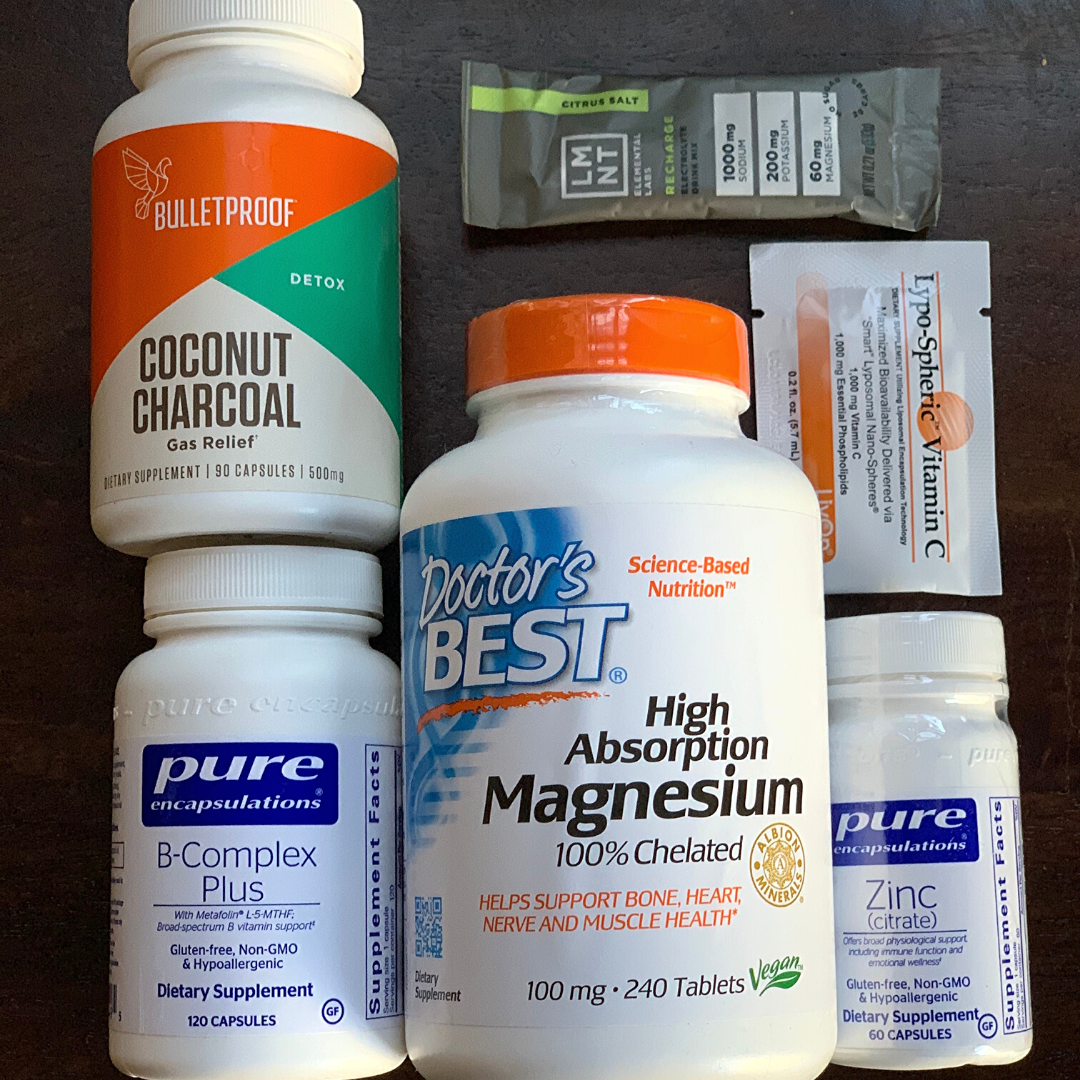
Hangover Rescue Pack
Activated charcoal
is one way to mitigate toxin load of additives in alcohol. Activated charcoal is a sponge that soaks up everything (there is a reason why it's used to pump stomachs in overdoses).
Take it apart from other medications or supplements; before or with alcohol. Wait 45-60 minutes before eating or consuming any supplements.
Restore B-vitamins
with a serving or two of red meat, pork, or a few eggs at the end of the night. Or take a B-Complex like this one.
Thiamine and B-12 are the biggies.
Restoring glutathione & vitamin C
is best achieved through supplementation because of the amount. You could eat some citrus, like add lime to your drink, for a bit of vitamin C (which converts to glutathione), but the amount required would tear up your stomach before you got enough.
Instead, take a liposomal glutathione or vitamin C. Liposomal means the water-soluble glutathione or vitamin C is encapsulated in a fat for better absorption and use. Otherwise, you pee most of it out.
Restoring hydration
It may be a myth that alcohol depletes electrolyte levels, but I still prefer electrolyte supplementation to help with hydration because it can help limit peeing in the middle of the night and aid sleep.
Here are my fave electrolyte supplements:
- LyteShow
- LMNT
- Nuun Tablets (no caffeine) if you’re in a bind
Add electrolytes to your drink or water in between drinks. OR take it before bed with other supplementation.
Magnesium & Zinc
are two supplements that support hormonal health and may be depleted while drinking.
For female hormonal health take:
- 300 mg of Magnesium (chelated helps reduce gastric distress)
- 25 mg Zinc
Here's how it works in practice...
Before drinking:
- 2-4 capsules of Activated Charcoal 10 min before or with alcohol
Wait 30-60 min before eating.
Can take electrolytes with alcohol or anytime.
Before bed:
- 1 capsule B-Complex
- 1000 mg Vitamin C
- 300 mg of Magnesium (chelated helps reduce gastric distress)
- 25 mg Zinc
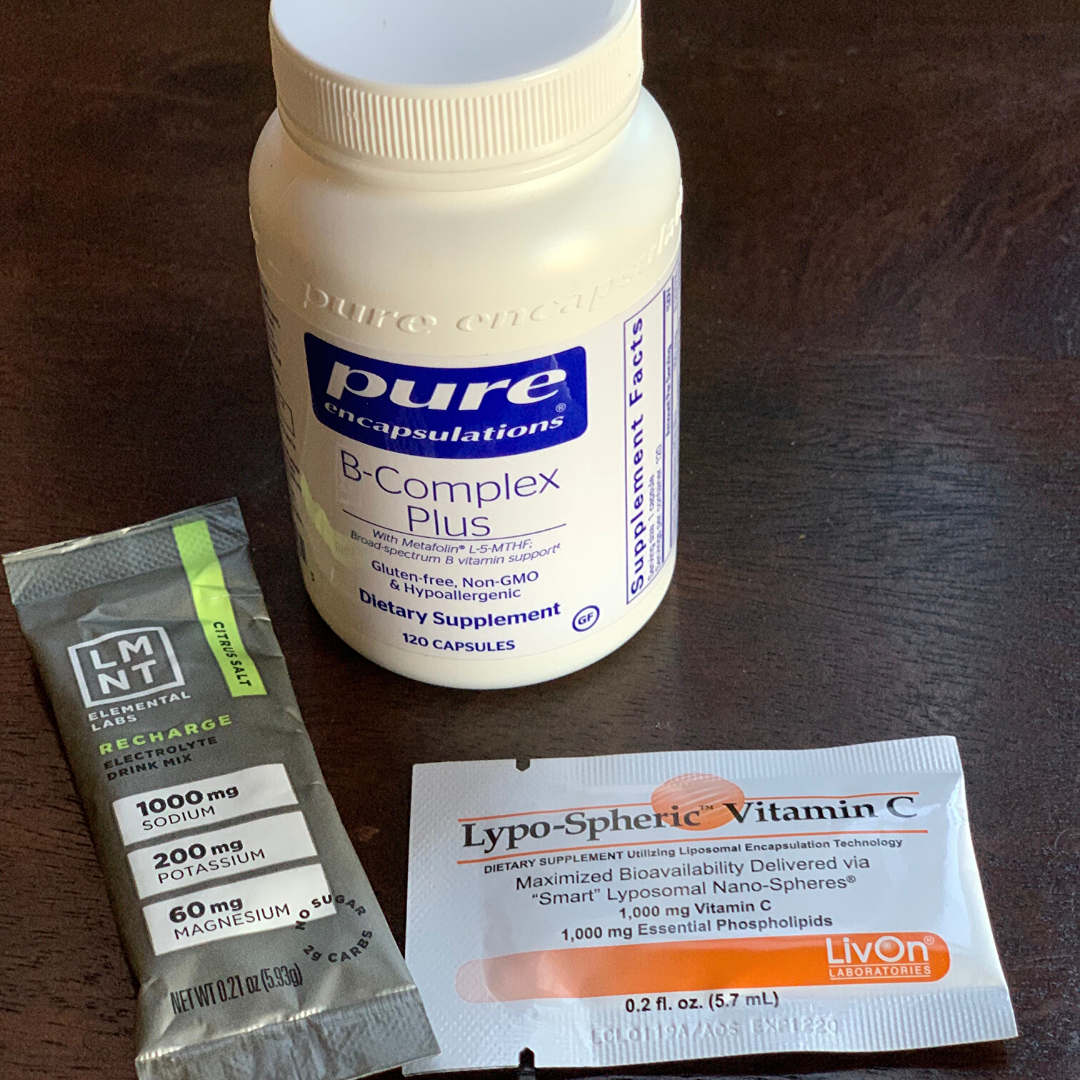
Bare Minimum: B-Complex + Vitamin C + Electrolytes
Here's the bare minimum "go-kit"
If you're on the go or "don't have time for all that", get these three + call it done...
- 1 cap B-Complex
- 1000 mg liposomal vitamin C
- Electrolytes
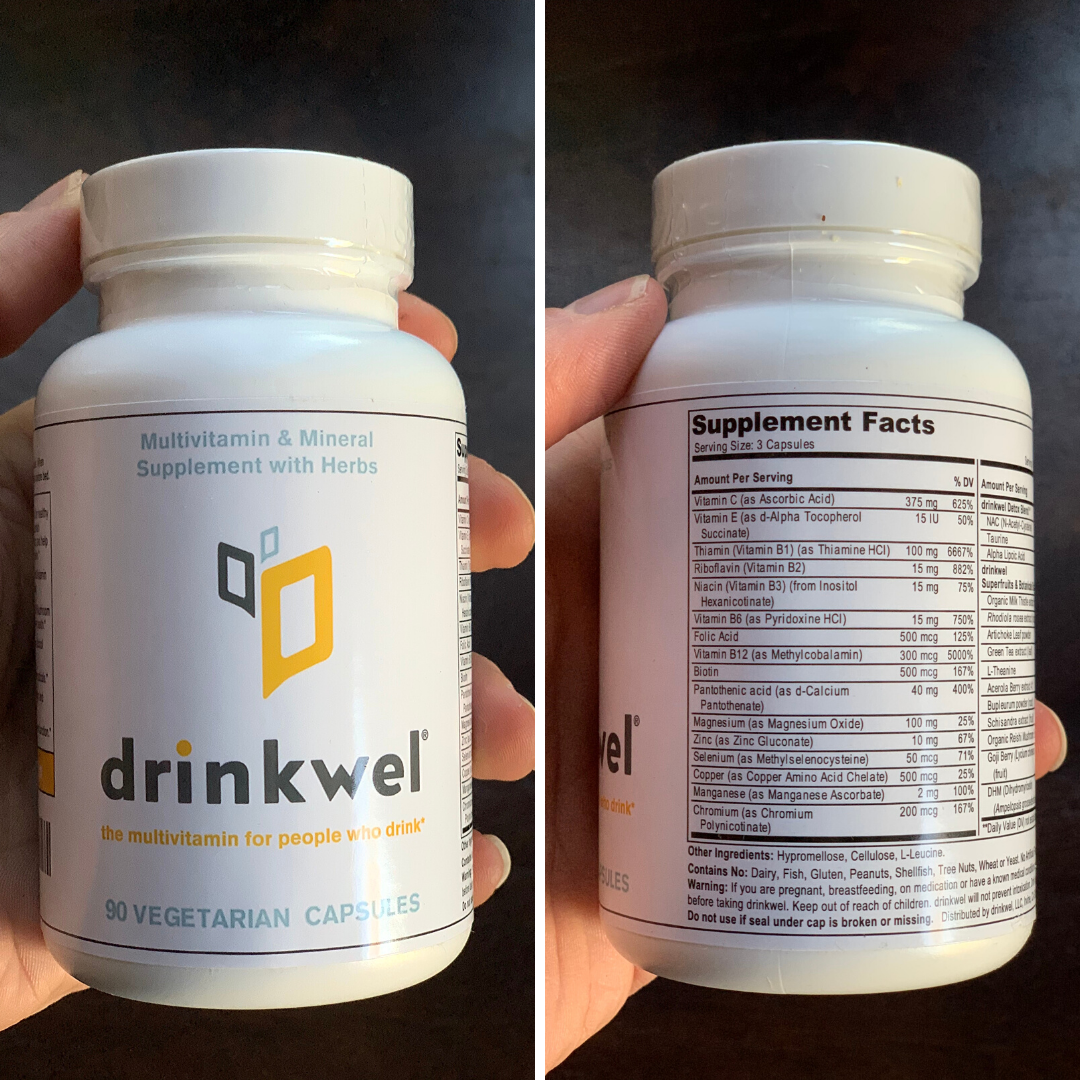
The best all-in-one supplement 'for people who drink'
DrinkWel
You could buy all the supplements separately OR you can use an all-in-one supplement to take care of everything. I fell in love with DrinkWel a few years ago and hands-down this is the best all-in-one supplement on the market to banish a hangover before it begins.
Beyond B-vitamins and vitamin C, DrinkWel also includes magnesium, zinc, L-Theanine, and many ingredients to support liver detoxification capacity, like Milk Thistle.
How to structure your evening
Many of the ill effects of hangovers come with the alcohol + impaired sleep combo. You’ve probably experienced falling asleep quickly and then either tossing and turning half the night OR feeling unrested the next morning.
Prioritize 7-9 hours of sleep, preferably asleep before midnight.
Then work backwards. For all of the alcohol to be out of your system before sleeping you need to stop drinking by 9 (preferably earlier) to account for any food in your stomach also.
In a perfect world you would…
- Enjoy 1-2 drinks on an empty stomach between 5-7P.
- Let those drinks metabolize for an hour
- Eat dinner including a hefty portion of meat + water
- Supplement
- Bed by 10P
Since this isn’t the reality for most people at parties, do this:
- Enjoy a drink when you arrive on an empty stomach
- Switch to water or sparkling water
- After 30-60 minutes, hit the buffet table for protein, especially animal products that contain bioavailable B-vitamins: meats, cured meats like salami or pepperoni, or cheeses. Nuts are okay too, but aim to limit quantity.
Wrapping Up
For most health-conscious people, alcohol can be enjoyed without fear of feeling terrible for the following few days. It is a matter of dose, quality, and replenishment.
You've learned how alcohol metabolism takes more than it gives, so it's important to support the body's natural detoxification processes with nutrition, supplementation, and sleep.
If you’ve enjoyed this guide compiling years of experience and experimentation with all things alcohol, leave a comment sharing what was most helpful for you.

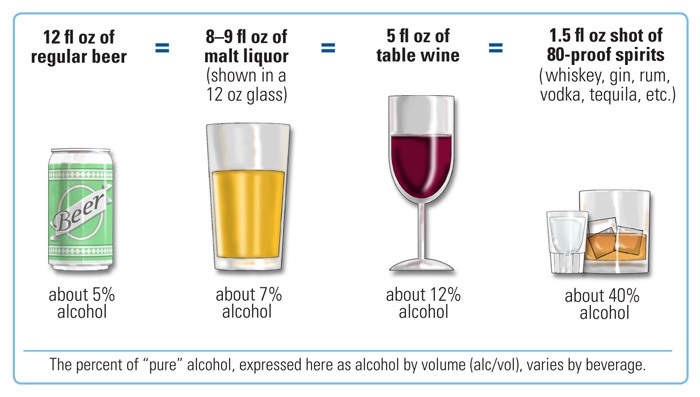
This article is fantastic! Love how comprehensive your supplement recommendations are.
I am SO GLAD you found it helpful Elissa. To waking up well!